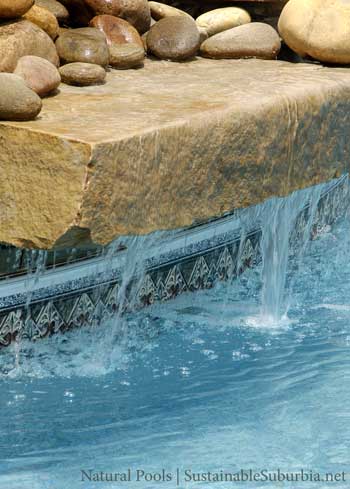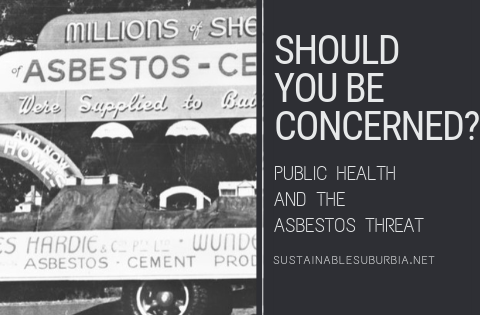 Many people really like the idea of having their own swimming pool, but are concerned about the potential health issues that associated with exposure to chlorine and other pool chemicals. Chlorine has been linked to a variety of health concerns including heart disease, asthma and even some cancers.
Many people really like the idea of having their own swimming pool, but are concerned about the potential health issues that associated with exposure to chlorine and other pool chemicals. Chlorine has been linked to a variety of health concerns including heart disease, asthma and even some cancers.
The good news is that there are a number of different options available to you including choosing alternative types of pools and using different skin treatments to act as a barrier between your skin and the chlorine. I want to focus on the former – alternative types of swimming pools.
Salt Water Swimming Pools
Some pool owners are turning to salt water swimming pools in a bid to avoid chlorine exposure. However, it is important to note that salt water pools are not actually chlorine free. That is not to say they are a poor choice as they are far lower in chlorine than a traditional pool. Salt water pools work with a chlorine generator rather than relying on you handling chlorine to be added manually.
The key fact here is that this is not a chemical free choice, so only go for a salt water pool if you are happy to reduce rather than eliminate pool chemicals.
Alternative Filters
One option you may wish to look into is a UV swimming pool filter (PDF). This means that the water in your pool shall be passed through Ultraviolet (UV) light which will kill off any micro-organisms including algae and bacteria. It is a non-chemical method of sanitizing your swimming pool and it is gaining in popularity.
Alternatively, you might wish to go down the ionization route which involves using cooper as an algaecide and zinc or silver as a bactericide. There are systems like the Floatron on the market which can be used to introduce ionization to your swimming pool.
Natural Swimming Pools
The option that interests me most of all is the natural swimming pool. These pools are chemical free and rely on plants to filter the water naturally. That does not mean you will be swimming around in a plant filled pond – these are restricted to a separate area than the swimming ‘zone’.
Natural swimming pools are really popular all across Europe and they are now beginning to get some real attention from American pool owners too. It may be more expensive at the outset, but maintenance costs are much lower as you do not need expensive filters or pool closing chemicals. Even if you already have a traditional chlorinated swimming pool you can convert this to a natural pool with just a few modifications.
When choosing a natural pool, water is filtered through a section containing rocks, plants and vegetation before being passed through a UV filter like those discussed above. Once the water is clean and aerated it is fed back into the swimming area of the pool – commonly via a small ‘waterfall’ feature. This makes for some really interesting design opportunities. Natural pools are much more creative than the standard concrete tub that represents most traditional pools!
In terms of choosing the best way to ditch pool chemicals, I am all for going for the natural pool option. I think it offers the best choice in terms of cost, maintenance and design. If this is not possible then choosing ultraviolet or ionization filtering is the next bet thing. If all else fails then a salt water pool will help to reduce chlorine exposure. The choice you make will depend on your own ideals so do weigh up all of your options before deciding.
Ameline Clerk loves writing about home design – both interior and exterior! She writes for poolproducts.com and particularly enjoys sharing her extensive knowledge of swimming pools with others.
_______
As usual, this post has been shared over at Essentially Jess.



The chlorine is the one thing I HATE about swimming pools. I taught swimming for 3 years and I just would hate how horrible and dry my skin would be, never mind the chlorine smell and the damaged hair!! I’m desperate for a pool, so these options sound like great alternatives!! Thanks x Karen #teamIBOT
Have you tried looking into salt water filters and small home swimming pools?
Thank you for your comment, I am glad you found it helpful 🙂
We’ve built a naturally filtered swimming pool. I’m planning a post about it soon as i get a chance.
Oh, I’ll be interested to read that Linda. It sounds like a lovely idea.
Interesting post – would love to spend more time swimming this summer but I have always hated that chlorine smell and wondered what it was doing to my hair and skin. I don’t have access to my own pool, so thanks for that link about ways to minimise exposure to chlorine – really helpful!
You’re welcome Emma, glad I could help 🙂
We have a salt water pool and we really enjoy it. It does cut down on a lot of that chlorine smell. I’m interested in possibly going the natural route though. I’ll have to look into it a bit more but sounds interesting. Thanks for sharing!
I love this idea. I really hate the chemical swimming pool. Using chemical swimming pool several times is fine, but frequently using is bad for your health
Have anybody used salt water in the above ground pool? Will walls of the pool have any problems with salt?
Thanks Kristen, it took me years to realize I was allergic to chlorine. Whenever I go to the swimming pool, I have a running nose and ears pain. A natural pool would be perfect for me 🙂
Did you mean both in-ground and above-ground pools? I saw some offering natural stuff. What do you suggest? BTW, your ideas are great to learn from.
Hi Kristen, I know you didn’t write the this article, but based on my research I have heard that plants can take longer to filter the pool. I have also read that there will often be more bugs in your pool if u you use this system.
What are your thoughts?
Some good info here. I have been getting concerned with the amount of chlorine and chemicals the pool shop was saying I need for my pool. Never had a pool before so real learning curve.
I know the word chemicals is loaded but chlorine pools have been around for a while for a reason. But it’s still great to point out alternatives. Thank you for weaving in interesting links, too. It was good to find more info on those websites. Many thanks.
Great Article. I am starting to research different types of pools for our backyard and this article is right on time. We was going to go with a clorine pool but know we have more research to do.
Does salt water afflict on pool coating? Does it decrease its lifetime or not?